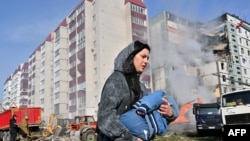On May 9, Vladimir Putin addressed the Victory Parade in Moscow -- a celebration of the Soviet Union’s victory over Nazi Germany in World War II.
Originally designed to show off the military might of the Soviet Union and then Russia, this year's parade signaled Moscow’s insecurities and declining military capacity, analysts said in a CNBC report headlined “Putin’s ‘One Tank’ Parade Was Embarrassment for Russia.”
Speaking from the Mausoleum tribune on Red Square, Putin draw parallels between WWII and the war in Ukraine, declaring that “civilization is once again at a decisive, turning point.”
He went on to claim that Russia was the one under attack, and that the goal of the war in Ukraine was to defend residents of Donbas, the eastern Ukrainian region partly under Russian occupation:
“A real war has once again been unleashed against our Motherland, but we have repulsed international terrorism, we will also protect the inhabitants of Donbass, and ensure our security.”
Those claims are false.
Russia’s full-scale military invasion of Ukraine began on February 24, 2022, and pushed far beyond Donbas – with the Russian warplanes bombing Ukraine’s major cities and tank columns surrounding the capital, Kyiv.
Russia had planned the war months ahead and carried out a massive disinformation campaign to cover up and deny its invasion preparations.
In November 2021, Russia began a major military build-up near Ukraine's borders with Russia and Belarus. The United States called the Russian military movements "unusual" activity. The Ukrainian Defense Ministry said about 90,000 Russian troops had been deployed along Ukraine's borders.
Forbes, citing American intelligence officials, reported in December 2021 that Russia was "laying the groundwork for a large-scale military offensive in Ukraine as soon as early 2022, involving 175,000 troops.”
In January 2022, U.S. President Joe Biden said he expected Putin to invade Ukraine soon: “My guess is he will move in.”
Russia denied plans to invade Ukraine. In November 2021, Putin's spokesman Dmitry Peskov called Western media reports of Russia's plans to invade Ukraine a “hollow and unfounded attempt to incite tensions.”
Weeks before the invasion, Russian Deputy Foreign Minister Sergei Ryabkov claimed that Russia has “no intention to invade Ukraine.”
On February 24, 2022, Putin announced what he called “a special military operation” -- a euphemism later declared the only acceptable description of Russia’s war on Ukraine, with use of the word “war” prohibited under criminal law.
“I made a decision to carry out a special military operation,” Putin said.
Fifteen months into the war, at least 8,709 Ukrainian civilians had been killed and 14,666 injured “as a result” of the Russian aggression. But the actual figures were likely significantly higher, the Office of the United Nations High Commissioner for Human Rights said on May 2.
The Russian aggression has reduced Ukraine's GDP by almost a third and destroyed 15 years of economic progress in Ukraine. The cost of rebuilding Ukraine is estimated at $411 billion, the World Bank reported on March 22. Nearly two million homes and more than 20 percent of healthcare facilities in Ukraine have been damaged by Russia's armed forces.
Russia has suffered an estimated 189,500 to 223,000 casualties, including 35,500 to 43,000 deaths. Ukraine’s losses are estimated between 124,500 to 131,000 troops, of which 15,500 to 17,500 were killed.
The International Criminal Court issued international arrest warrants for Putin and children's rights commissioner Maria Lvova-Belova on March 11. They both stand accused of deporting Ukrainian children to Russia, which constitutes a war crime and crime against humanity, genocide, under the international law.
The international community largely condemned Russia's invasion.
The European Union said, on February 24, 2022, that the invasion was an “unprovoked and unjustified military aggression against Ukraine” and a violation of international law:
“Russia bears full responsibility for this act of aggression and all the destruction and loss of life it will cause. It will be held accountable for its actions.”
On March 2, 2022, the U.N. General Assembly adopted a resolution stating that Russia’s war on Ukraine was in violation of the UN Charter and demanding “that the Russian Federation immediately cease its use of force against Ukraine.”
Many countries, primarily in the West, have imposed economic and diplomatic sanctions as part of the effort to force Russia to withdraw its forces from Ukraine and end the war.
On April 26, 2022, delegates from the United States and 40 allied countries met at Ramstein Air Base in Germany. They formed a coalition, the Ukraine Defense Contact Group, to provide military assistance to Ukraine to defeat Russia’s “unjust invasion”.
U.S. Defense Secretary Lloyd Austin assured reporters after the summit: “I know that all the leaders leave today more resolved than ever to support Ukraine in its fight against Russian aggression and atrocities.”
The countries of the Defense Contact Group, which numbered more than 50 by January 2023, have sent some $60 billion worth of military assistance to Ukraine. Security assistance committed to Ukraine includes anti-aircraft systems, anti-armor systems, artillery rounds, rockets, tanks and ammunition, HIMARS and ammunition, etc.
According to the U.S. Department of State, since “Russia’s launched its premeditated, unprovoked, and brutal war against Ukraine,” the U.S. has sent Kyiv more than $35.7 billion in security assistance “to demonstrate our enduring and steadfast commitment to Ukraine’s sovereignty and territorial integrity.”
On May 2, for the first time since Russia’s full-scale invasion, China and India voted in favor of a U.N. resolution that explicitly recognizes "the aggression by the Russian Federation against Ukraine." The two countries have been accused of supporting Russia economically and diplomatically since the beginning of the war.





